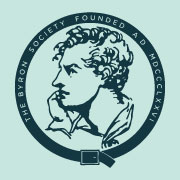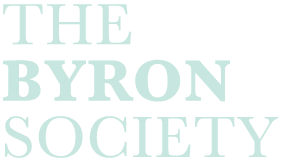We host a wide range of events, if you are interested in the details of any of our past events, or wish to discuss hosting something similar, please contact us or email contact@thebyronsociety.com.
2023
[ezcol_1third] [/ezcol_1third] [ezcol_2third_end] Live reading of Byron’s Vision of Judgement
[/ezcol_1third] [ezcol_2third_end] Live reading of Byron’s Vision of Judgement
22nd January ONLINE
To take place on Byron’s 235th birthday
Hosted by The Byron Society of America,
The Fordham Romantics Group (John Bugg),
and Susan Wolfson (Princeton University).
More Details [/ezcol_2third_end]
[ezcol_1third]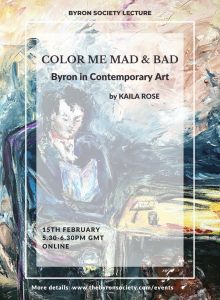 [/ezcol_1third] [ezcol_2third_end] ‘Color Me Mad and Bad: Byron in Contemporary Art’ by Kaila Rose
[/ezcol_1third] [ezcol_2third_end] ‘Color Me Mad and Bad: Byron in Contemporary Art’ by Kaila Rose
15th February ONLINE
In this lecture, Kaila Rose will showcase conversations she has had with artists today who have been inspired to explore themselves through shaping works of featuring Lord Byron. By reading Byron’s texts, these artists developed a desire to touch, to paint, to linger in his lines through creating their own translation of experiencing identification with the poet.
More Details [/ezcol_2third_end]
[ezcol_1third]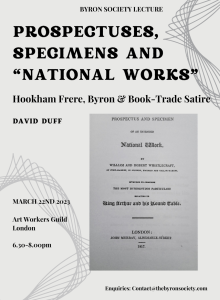 [/ezcol_1third] [ezcol_2third_end] Prospectuses, Specimens and “National Works”: Hookham Frere, Byron and Book-Trade Satire, by David Duff
[/ezcol_1third] [ezcol_2third_end] Prospectuses, Specimens and “National Works”: Hookham Frere, Byron and Book-Trade Satire, by David Duff
22nd March – IN PERSON
In this lecture, David Duff will show how Hookam Frere’s wide-ranging satire of the British book trade, including marketing devices such as prospectuses, specimens, and grandiose-sounding labels like ‘national work’, has multiple echoes in Byron’s poetry.
More Details [/ezcol_2third_end]
[ezcol_1third]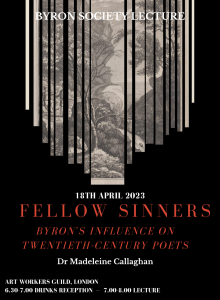 [/ezcol_1third] [ezcol_2third_end] Fellow Sinners: Byron’s Influence on Twentieth-Century Poets, by Madeline Callaghan
[/ezcol_1third] [ezcol_2third_end] Fellow Sinners: Byron’s Influence on Twentieth-Century Poets, by Madeline Callaghan
18th April, IN PERSON
In the twentieth-century, Byron offers poetic opportunities for new generations of poets. This talk considers Byron’s influence not as subconscious but as deliberately fashioned by his inheritors, where W. B. Yeats, W. H. Auden, and John Berryman choose the way in which Byron functions as a model in their poetry.
More Details [/ezcol_2third_end]
[ezcol_1third]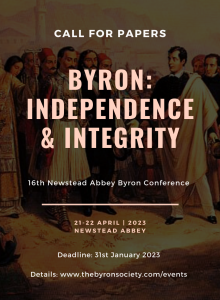 [/ezcol_1third] [ezcol_2third_end] 2023 Newstead Abbey Byron Conference
[/ezcol_1third] [ezcol_2third_end] 2023 Newstead Abbey Byron Conference
April 21-22, 2023 (at Newstead Abbey).
In July 1823, Byron embarked upon his ill-fated trip to Greece. Although this trip resulted in his death at the age of 36, it also redeemed a somewhat tarnished reputation and forever immortalised him as the poet of liberty and revolution….
More Details [/ezcol_2third_end]
[ezcol_1third]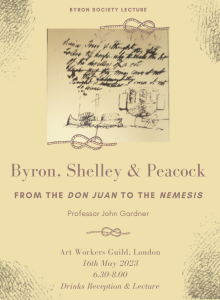 [/ezcol_1third] [ezcol_2third_end] 16th May 2023 AGM, and lecture from Professor John Gardner
[/ezcol_1third] [ezcol_2third_end] 16th May 2023 AGM, and lecture from Professor John Gardner
Byron, Percy Shelley and Thomas Love Peacock were famously keen on boats. After our annual AGM, there will be a drinks reception and a lecture from Professor John Gardner on the fascination which steam ships held for these nautical Romantics…
More Details [/ezcol_2third_end]
[ezcol_1third]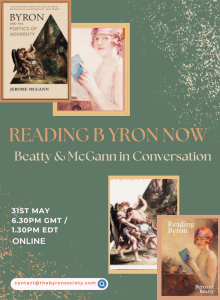 [/ezcol_1third] [ezcol_2third_end] ‘Reading Byron Now: Beatty and McGann in Conversation
[/ezcol_1third] [ezcol_2third_end] ‘Reading Byron Now: Beatty and McGann in Conversation
31st May – ONLINE
This is a joint event, hosted by the Byron Society and Byron Society of America. Join us for a lively conversation in which Bernard Beatty and Jerome McGann will discuss their new books on Byron with one another and the audience: Beatty’s Reading Byron and McGann’s Byron and the Poetics of Adversity. Hosted by Emily Paterson-Morgan and Andrew Stauffer…
More Details [/ezcol_2third_end]
[ezcol_1third]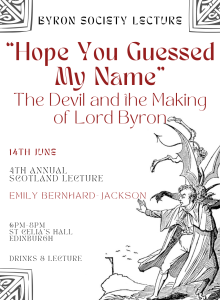 [/ezcol_1third] [ezcol_2third_end] “Hope You Guessed My Name”: The Devil and the Making of Lord Byron, by Emily Bernhard Jackson
[/ezcol_1third] [ezcol_2third_end] “Hope You Guessed My Name”: The Devil and the Making of Lord Byron, by Emily Bernhard Jackson
14 June – Edinburgh
Our 4th Annual Scotland Lecture is affiliated with the British Association of Romantic Studies Post Graduate Conference. Our members can not only join us for the lecture and drinks reception but will also have the opportunity to attend a special Byron panel, sponsored by the Byron Society, on the 15th of June. We will also be organising a cultural tour in Edinburgh prior to the lecture, details to follow.
More Details [/ezcol_2third_end]
[ezcol_1third]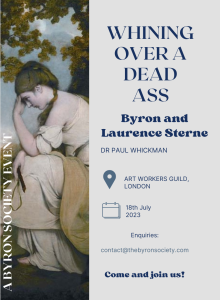 [/ezcol_1third] [ezcol_2third_end] Whining over a dead ass: Byron and Laurence Sterne, by Paul Whickman
[/ezcol_1third] [ezcol_2third_end] Whining over a dead ass: Byron and Laurence Sterne, by Paul Whickman
18th July, IN PERSON
In this talk, Paul Whickman will argue it was not just Sterne’s irreverence that engaged Byron, but his ability to be ‘half serious’; how mourning a dead ass, for instance, can elicit mockery but also genuine pathos.
More Details [/ezcol_2third_end]
Feeling Ridiculous with Lord Byron, by Dr Andy McInnes
19th September, IN PERSON
Byron enjoyed a joke, from bringing a pet bear to college to get round a ban on dogs to ridiculing everything and everyone, including himself, in Don Juan. This talk will explore Byron’s relationship with the ridiculous.
“let my works be bound in Red”: Bookbinding and the Packaging of Romanticism, By Dr Lindsey Eckert
14th November – ONLINE
Writing to John Cam Hobhouse, Lord Byron joked that he hoped his works would “be bound in <em>Red</em>” after his death. Likely a reference to luxurious red leather bindings that were popular in the Romantic era, Byron’s comments reveal the poet’s occupation with the material forms his posthumous reputation might take.
[ezcol_2third_end] ‘Humphry Davy’s Notebooks’, by Professor Sharon Ruston
18th October – ONLINE
Sir Humphry Davy (1778-1829) was the foremost chemist of the early nineteenth century. It is less well known that he wrote poetry throughout his life. He was a friend of Lord Byron and wrote at least two poems about Byron. In this talk, Sharon Ruston will explore these poems and examine some of the poetry Davy wrote in his notebooks while in the laboratory conducting chemical experiments.
More Details [/ezcol_2third_end]
2022
[ezcol_1third]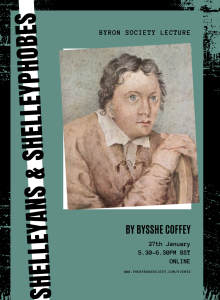 [/ezcol_1third] [ezcol_2third_end] Shelleyans and Shelleyphobes: Shelley’s Posthumous Reputation’ by Bysshe Coffey
[/ezcol_1third] [ezcol_2third_end] Shelleyans and Shelleyphobes: Shelley’s Posthumous Reputation’ by Bysshe Coffey
27th January
Bysshe Inigo Coffey explored the phenomenon of ‘High Shelleyanism’, and tell the story of some of its Shelleyans, Shelleyites, and the Shelleyphobes. [/ezcol_2third_end]
[ezcol_1third] [/ezcol_1third] [ezcol_2third_end]’Editing Byron for the 21st Century’ by Prof. Andrew Stauffer and Prof. Jonathan Sachs
[/ezcol_1third] [ezcol_2third_end]’Editing Byron for the 21st Century’ by Prof. Andrew Stauffer and Prof. Jonathan Sachs
15th February – ONLINE
A talk from Professor Andrew Stauffer and Professor Jonathan Sachs about their new edition of Byron’s poetry. Why publish a new edition now, how did they make their selection, and what are their favourite works – all these questions were answered and more. [/ezcol_2third_end]
[ezcol_1third] [/ezcol_1third] [ezcol_2third_end]’Solace at Midnight? Byron, Sleep, and Writing’ by Marc Gotthardt
[/ezcol_1third] [ezcol_2third_end]’Solace at Midnight? Byron, Sleep, and Writing’ by Marc Gotthardt
28 March – PHYSICAL
‘All convulsions end with me in rhyme; and to solace my midnights, I have scribbled another Turkish story’ writes Byron. In this lecture, Marc Gotthardt will explore Byron’s fraught relationship with sleep and dreams.
More Details [/ezcol_2third_end]
[ezcol_1third]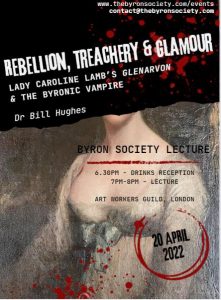 [/ezcol_1third] [ezcol_2third_end] ‘Rebellion, treachery, and glamour: Lady Caroline Lamb’s Glenarvon and the progress of the Byronic vampire’
[/ezcol_1third] [ezcol_2third_end] ‘Rebellion, treachery, and glamour: Lady Caroline Lamb’s Glenarvon and the progress of the Byronic vampire’
20 April – PHYSICAL
Dr Bill Hughes suggests Lady Caroline Lamb’s villainous Glenarvon is the inspiration for a series of vampiric heroes from the Brontës to the sympathetic vampires of paranormal romances such as Twilight; he is ‘arch fiend’ and ‘fallen angel’, and howls at the moon (his ancestor drinks blood from a skull).
More details here. [/ezcol_2third_end]
[ezcol_1third]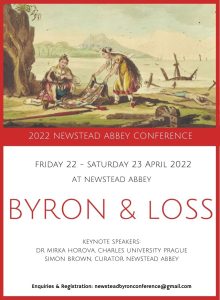 [/ezcol_1third] [ezcol_2third_end]22-23 April – PHYSICAL
[/ezcol_1third] [ezcol_2third_end]22-23 April – PHYSICAL
Newstead Abbey Byron Conference: Byron and Loss
Postponed since 2020, we hope this wonderful annual event will be finally resume. Held at Newstead Abbey, it represents a highlight of the Byronic calendar. Event programme to follow.
Details here. [/ezcol_2third_end]
[ezcol_1third] 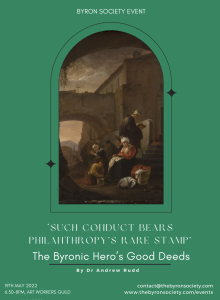 [/ezcol_1third] [ezcol_2third_end] 19th May – PHYSICAL
[/ezcol_1third] [ezcol_2third_end] 19th May – PHYSICAL
‘The Byronic Hero and Philanthropy’, Dr Andrew Rudd
Cloaked in disdain, and ‘a hater of his kind’ bearing within ‘a vital scorn of all’ (as Lara is described), the Byronic hero may seem an unlikely candidate for a philanthropist. But on closer inspection, Byron’s personas perform good deeds as a means to exert influence outside the existing order. [/ezcol_2third_end]
[ezcol_1third] [/ezcol_1third] [ezcol_2third_end]Performing the Promethean Self in Childe Harold’s Pilgrimage III-IV and Cain
[/ezcol_1third] [ezcol_2third_end]Performing the Promethean Self in Childe Harold’s Pilgrimage III-IV and Cain
30 June – PHYSICAL
Francesco Marcionni will share his insights into the depictions of Prometheus and the Promethean self in Byron’s Cain: A Mystery and Childe Harold’s Pilgrimage. The travel narrative of Harold, the ruinous Venetian landscape and Cain’s will to transcend eternity each fictionalize a Byronic vision of poetry, a visionary mode in which imaginative and aesthetic self-fashioning discloses a fragmented identity.
More details here. [/ezcol_2third_end]
[ezcol_1third]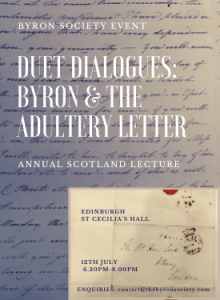 [/ezcol_1third] [ezcol_2third_end] 12th July – PHYSICAL
[/ezcol_1third] [ezcol_2third_end] 12th July – PHYSICAL
Drawing on materials from the John Murray Archive, Dr Emily Paterson-Morgan (Director of The Byron Society) will discuss one of the most peculiar and – frankly – ludicrous episodes in Byron’s extremely complex love life: the brief, passionate, yet ultimately unconsummated affair with Lady Frances Webster which allegedly started during a game of billiards.
[ezcol_1third]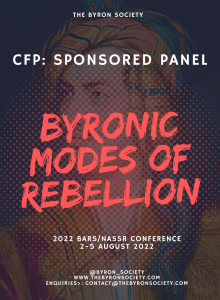 [/ezcol_1third] [ezcol_2third_end] 2nd-5th August – PHYSICAL
[/ezcol_1third] [ezcol_2third_end] 2nd-5th August – PHYSICAL
The Byron Society is sponsoring a panel and a drinks reception at the 2022 BARS/NASSR conference on New Romanticisms. From his carefully rumpled ‘poetic’ attire and sexual preferences, to his involvement with revolutionary groups in Italy and Greece, Byron was and remains an inherently rebellious figure. The same is true of his poetry, with its daring new forms and highly contentious treatment of sexual, political and religious themes. We want to stimulate new discussions of Byronic rebellion with our sponsored panel. We are also sponsoring the Drinks Reception before the Conference Dinner, at the Maritime Museum.
More Details and CFP [/ezcol_2third_end]
[ezcol_1third]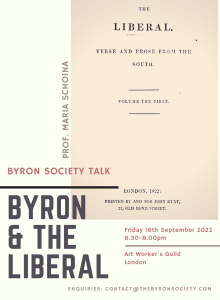 [/ezcol_1third] [ezcol_2third_end] 16th September – PHYSICAL
[/ezcol_1third] [ezcol_2third_end] 16th September – PHYSICAL
The Liberal was a short-lived and ill-fated journal often viewed as an enterprise which was falling apart before it even began. To launch a celebration of the bicentenary of The Liberal, Dr Maria Schoina will consider his relationship with the journal.
More Details [/ezcol_2third_end]
[ezcol_1third]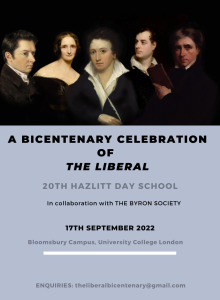 [/ezcol_1third] [ezcol_2third_end] 17th September – PHYSICAL
[/ezcol_1third] [ezcol_2third_end] 17th September – PHYSICAL
The Byron Society is collaborating with the Hazlitt Society to host a one-day conference on The Liberal, celebrating the bicentenary of this highly significant publication. Recent reappraisals of The Liberal highlight its reformist relationship to literature and politics and look at the periodical as an intellectually coherent and forward-looking project which promoted, within its pages, the internationalist tendencies of its writers, multilingualism, liberal knowledge, intellectual community, a dialectical relationship with continental sources, and translation as the new international aesthetic.
More Details [/ezcol_2third_end]
[ezcol_1third] [/ezcol_1third] [ezcol_2third_end] ‘Thomas Campbell – The Forgotten Romantic Poet’ by Amy Wilcockson
[/ezcol_1third] [ezcol_2third_end] ‘Thomas Campbell – The Forgotten Romantic Poet’ by Amy Wilcockson
13th October ONLINE
Amy Wilcockson will explore Campbell’s life, letters, and legacy, plus reveal his connections to the Byrons, through her ongoing project editing Campbell’s correspondence. She will also make the case for returning Campbell to his rightful prominence as one of the eminent literary figures of the Romantic period.
More Details [/ezcol_2third_end]
[ezcol_1third]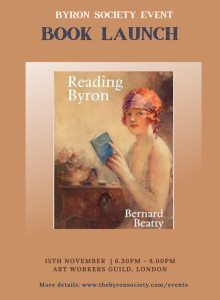 [/ezcol_1third] [ezcol_2third_end] ‘Reading Byron’ by Bernard Beatty – Book Launch
[/ezcol_1third] [ezcol_2third_end] ‘Reading Byron’ by Bernard Beatty – Book Launch
15th November – Art Workers Guild
This is a book launch, wine reception and poetry reading for Bernard Beatty’s long-awaited new book “Reading Byron”. The event will include an interview with Bernard, discussion of the book’s key themes, and some poetry readings.
More Details [/ezcol_2third_end]
[ezcol_1third]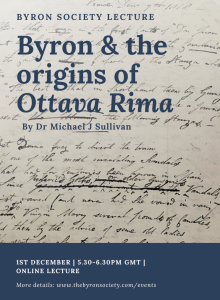 [/ezcol_1third] [ezcol_2third_end] ‘Byron and the Origins of Ottava Rima’ by Dr Michael J Sullivan
[/ezcol_1third] [ezcol_2third_end] ‘Byron and the Origins of Ottava Rima’ by Dr Michael J Sullivan
1st December ONLINE
In this lecture, Dr Michael J Sullivan will explore the genesis of Byron’s most celebrated verse form: the ottava rima of Don Juan and Beppo. Tracing the form’s origins in Byron’s notebooks and early works, the talk will uncover how Byron’s ottava rima emerges from a sustained series of manuscript experiments that predate his arrival in Italy.
More Details [/ezcol_2third_end]
2021
[ezcol_1third]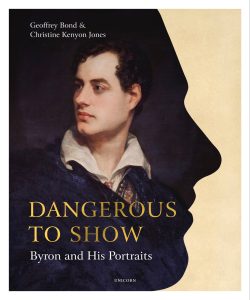 [/ezcol_1third] [ezcol_2third_end] ‘Dangerous to Show: Byron and His Portraits’ by Dr Christine Kenyon Jones and Geoffrey Bond
[/ezcol_1third] [ezcol_2third_end] ‘Dangerous to Show: Byron and His Portraits’ by Dr Christine Kenyon Jones and Geoffrey Bond
15th January
In this illustrated online talk about their new book, Geoffrey Bond and Dr Christine Kenyon Jones show how Byron’s visual image played a crucial part in his life, work and celebrity. They discuss how the Byronic image was advertised and immortalized through memorabilia ranging from heroic medals to tie-pins, and from satirical cartoons to puzzle-prints. [/ezcol_2third_end]
[ezcol_1third]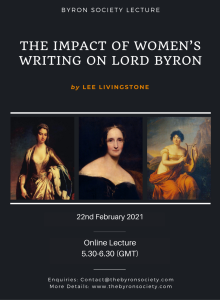 [/ezcol_1third] [ezcol_2third_end] 22nd February, ‘The Impact of Women’s Writing on Lord Byron’ by Lee Livingstone
[/ezcol_1third] [ezcol_2third_end] 22nd February, ‘The Impact of Women’s Writing on Lord Byron’ by Lee Livingstone
This online talk explored Lord Byron’s interest in women’s writing and the impact several of these women writers had over his career. Attention was given to three literary figures in particular, whose writings and opinions Byron held in very high regard. These are Lady Mary Wortley Montagu, Madame de Staël, and Mary Shelley. [/ezcol_2third_end]
[ezcol_1third] [/ezcol_1third] [ezcol_2third_end] 19th March, “‘A name, a wretched picture, and worse bust’: Byron’s Artefacts of Fame”, by Leigh Wetherall-Dickson
[/ezcol_1third] [ezcol_2third_end] 19th March, “‘A name, a wretched picture, and worse bust’: Byron’s Artefacts of Fame”, by Leigh Wetherall-Dickson
Leigh Wetherall Dickson gave a talk on Byron’s views of posterity and permanence, as represented by the concept of having one’s bust immortalised in marble, and in relation to the context of creative uncertainty that produced one of Byron’s most famous and scandalous poems, the great satirical epic Don Juan.
[ezcol_1third]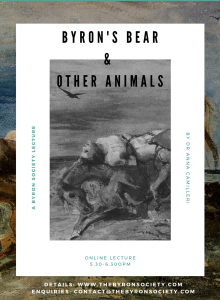 [/ezcol_1third] [ezcol_2third_end] 22nd April, ‘Byron’s Bear and Other Animals’ by Anna Camilleri
[/ezcol_1third] [ezcol_2third_end] 22nd April, ‘Byron’s Bear and Other Animals’ by Anna Camilleri
The pages of Byron’s letters and journals teem with animal life, as does his poetry. Living up to the poet’s claim in Don Juan that ‘truth is always strange; / Stranger than fiction’, this talk revealed how Byron’s treatment of animals — both actual and imagined — offer the most intriguing collusion of fantasy and reality. [/ezcol_2third_end]
[ezcol_1third] 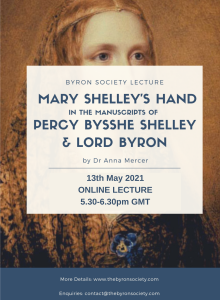 [/ezcol_1third] [ezcol_2third_end] 13th May, ‘Mary Shelley’s hand in the manuscripts of Percy Bysshe Shelley and Lord Byron’ by Dr Anna Mercer
[/ezcol_1third] [ezcol_2third_end] 13th May, ‘Mary Shelley’s hand in the manuscripts of Percy Bysshe Shelley and Lord Byron’ by Dr Anna Mercer
In this talk, Dr Anna Mercer (Cardiff University) discussed how manuscripts can provide evidence of Mary Shelley’s involvement in the productions of two of her literary companions: her husband Percy Bysshe Shelley and her friend Lord Byron. Mary Shelley is, of course, now understood as an iconic and prolific author in her own right. This paper argued that another way Mary Shelley has been overlooked is the lack of attention paid to her role as amanuensis and sometimes contributor to her literary associates’ works. [/ezcol_2third_end]
[ezcol_1third] 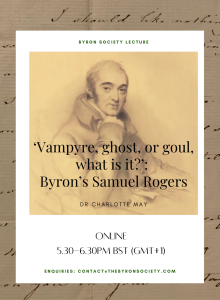 [/ezcol_1third] [ezcol_2third_end]10th June, ‘Vampyre, ghost, or goul, what is it?’: Byron’s Samuel Rogers a talk by Dr Charlotte May
[/ezcol_1third] [ezcol_2third_end]10th June, ‘Vampyre, ghost, or goul, what is it?’: Byron’s Samuel Rogers a talk by Dr Charlotte May
Byron’s relationship with Rogers began with appreciation for the doors that Rogers could open for him in society as well as his poetry, but ended with Byron writing in a “private” letter to John Murray that Rogers was ‘the Cancer of his Species’. This talk charteds the development of this fascinating relationship, and how Byron’s relationship with Rogers sheds light on two of the best known figures of literary society in the Romantic period.
[ezcol_1third] 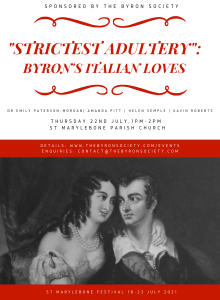 [/ezcol_1third] [ezcol_2third_end] 22nd July, ‘Strictest Adultery: Byron’s Italian Loves’, part of the St Marylebone Festival
[/ezcol_1third] [ezcol_2third_end] 22nd July, ‘Strictest Adultery: Byron’s Italian Loves’, part of the St Marylebone Festival
From catfights and arson to high society parties and attempted murder, this event offers an intimate insight into Byron’s Italian love life, told in his own words and introduced by Dr Emily Paterson Morgan. Sopranos Amanda Pitt and Helen Semple bring these romantic liaisons and affairs to life in songs, arias as a female response to Byron’s words. Music by Mozart, Fanny Hensel, Rossini, Bellini and more!
[/ezcol_2third_end]
[ezcol_1third] 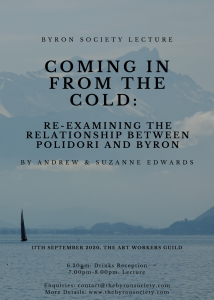 [/ezcol_1third] [ezcol_2third_end] 17th September, ANNUAL AGM, and Byron Society Lecture
[/ezcol_1third] [ezcol_2third_end] 17th September, ANNUAL AGM, and Byron Society Lecture
‘Coming in from the Cold: Re-examining the relationship between Polidori and Byron’ by Andrew and Suzanne Edwards. ‘Poor Polidori’ or ‘Polly Dolly’ are just two of the dismissive epithets bestowed on Dr John William Polidori, which reflect his marginalization in the retelling of events from the summer of 1816. This talk will explore the poet’s journey via the incidents and events recorded by his physician, with the intention of sympathetically portraying Polidori as a three-dimensional human-being, warts and all, rather than a simple caricature. [/ezcol_2third_end]
[ezcol_1third]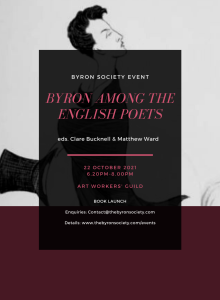 [/ezcol_1third] [ezcol_2third_end] 22nd October, Book Launch: Byron Among the English Poets
[/ezcol_1third] [ezcol_2third_end] 22nd October, Book Launch: Byron Among the English Poets
Byron Among the English Poets is based on an excellent series of papers given at a conference jointly sponsored by The Byron Society and All Souls College, Oxford. We were thrilled to be a part of this event back in 2018 and are equally excited to host the book launch for this wonderful book. [/ezcol_2third_end]
[ezcol_1third]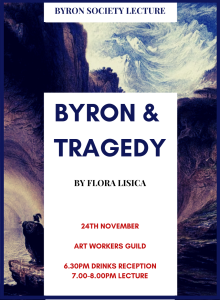 [/ezcol_1third] [ezcol_2third_end] 24th November. ‘Byron and Tragedy’ by Flora Lisica
[/ezcol_1third] [ezcol_2third_end] 24th November. ‘Byron and Tragedy’ by Flora Lisica
This talk explored Byron’s interest in tragedy, and particularly his writing of a number of tragedies to be read rather than staged. Taking Manfred (1817) as a central example, it considered the difference between tragedy on the page and in the theatre, particularly in light of Regency theatre and reading culture, and ideas of celebrity and privacy, community and isolation. [/ezcol_2third_end]
2020
[ezcol_1third]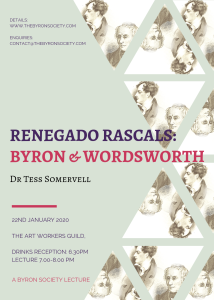 [/ezcol_1third] [ezcol_2third_end]
[/ezcol_1third] [ezcol_2third_end]
‘Renegado Rascals: Byron and Wordsworth’ by Dr Tess Somervell.
January 22nd, 2020
This talk traced Byron and Wordsworth’s tempestuous relationship. They only met in person once, but over several decades they traded insults – professional and personal – and accusations of plagiarism through their poems, reviews, and letters. However, there are also hints of mutual respect and admiration, even reverence.
[/ezcol_2third_end]
[ezcol_1third]  [/ezcol_1third] [ezcol_2third_end]February 13th, 2nd Annual Scotland Lecture, ‘Byron and Scottish Poetry’ by Dr Daniel Cook
[/ezcol_1third] [ezcol_2third_end]February 13th, 2nd Annual Scotland Lecture, ‘Byron and Scottish Poetry’ by Dr Daniel Cook
Looking back on his early life in Aberdeen, Byron declared that he was “half a Scot by birth, and bred / A whole one”. In August 1798, he left Scotland to take up his English title, never to return. Dr Daniel Cook considers what happens when we read Byron’s poetry more firmly in the context of his Anglo-Scottish identity. Is such poetry “Scottish” in its form or content, or perhaps something else entirely? How have other poets responded to Byron’s Scottish poems? [/ezcol_2third_end]
[ezcol_1third]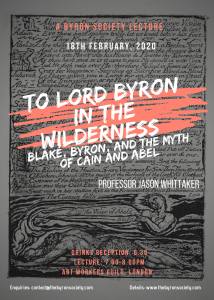 [/ezcol_1third] [ezcol_2third_end] 18th February, ‘To Lord Byron in the Wilderness: Blake, Byron, and the myth of Cain and Abel’ by Professor Jason Whittaker
[/ezcol_1third] [ezcol_2third_end] 18th February, ‘To Lord Byron in the Wilderness: Blake, Byron, and the myth of Cain and Abel’ by Professor Jason Whittaker
In 1822, Blake wrote a response to Byron’s play Cain, a short one-act drama entitled The Ghost of Abel in which he compared the more famous poet to Elijah and sought to offer a correction not to Byron’s purported Satanism but rather his proto-Calvinism. This paper will explore the contexts for Blake’s response to Byron, how he recognised in the younger writer a poetic rebellion against what Blake identified as the Moral Law without a corresponding understanding of a fundamentally humanistic Everlasting Gospel. [/ezcol_2third_end]
[ezcol_1third]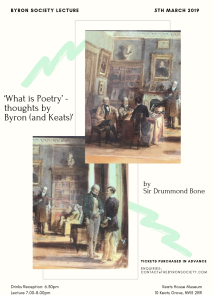 [/ezcol_1third] [ezcol_2third_end]
[/ezcol_1third] [ezcol_2third_end]
5th March, ‘What is Poetry – thoughts by Byron (and Keats)’ by Sir Drummond Bone.
Spinning off from Byron’s fragment ‘Harmodia’ and Keats unfinished ‘Fall of Hyperion’, this talk explores Byron’s thoughts on what makes poetry and what makes the poet.
It is a public lecture, held at Keats House.
[/ezcol_2third_end]
2019
[ezcol_1third]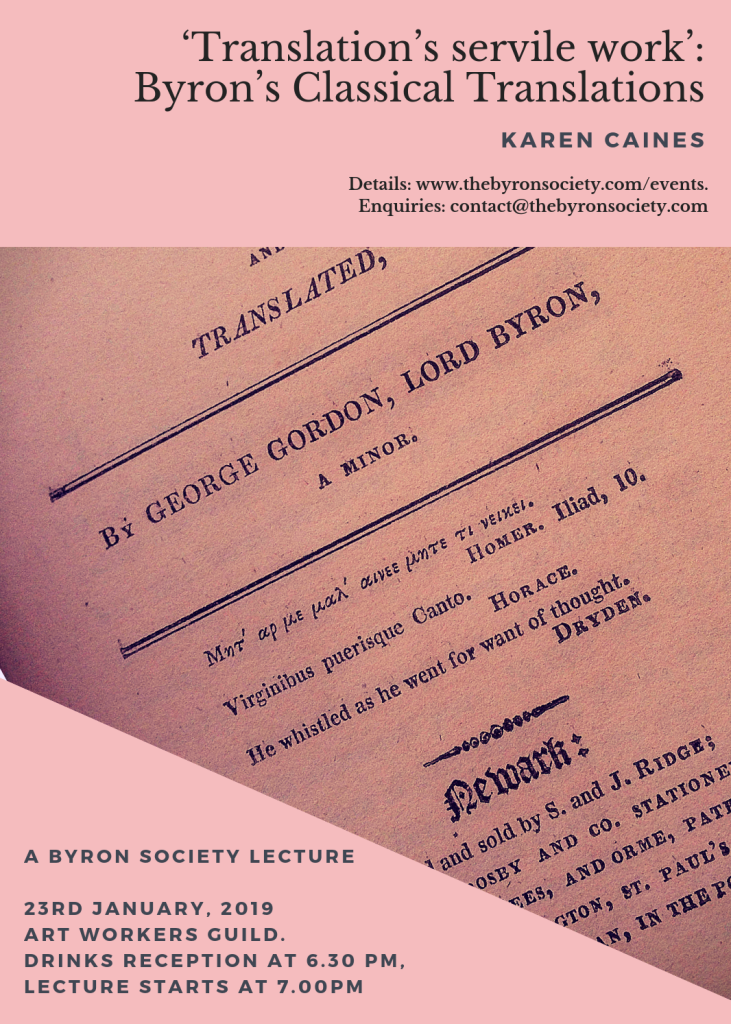 [/ezcol_1third] [ezcol_2third_end]
[/ezcol_1third] [ezcol_2third_end]
Karen Caines ‘Translation’s Servile Work’: Byron’s Classical Translations.
23rd January 2019
Art Workers Guild
In this talk, Karen Caines (DPhil student, Oxford) examined Byron’s engagement with classical translations over the course of his poetic career.
No knowledge of Latin or Greek required. [/ezcol_2third_end]
[ezcol_1third] 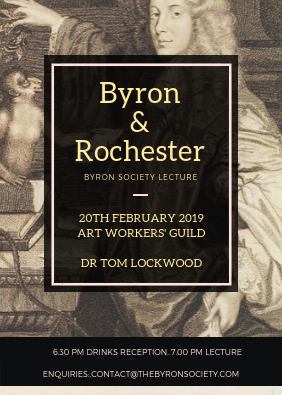 [/ezcol_1third] [ezcol_2third_end] Dr Tom Lockwood “Byron & Rochester”
[/ezcol_1third] [ezcol_2third_end] Dr Tom Lockwood “Byron & Rochester”
20th February 2019
Art Workers Guild
This lecture explored the things Byron might have known about the poetry and life of John Wilmot, second earl of Rochester, some of the things that he did with that knowledge in his own writing, and some of the ways in which Byron’s contemporaries used the cautionary narrative of Rochester’s life to do things to Byron. [/ezcol_2third_end]
[ezcol_1third] 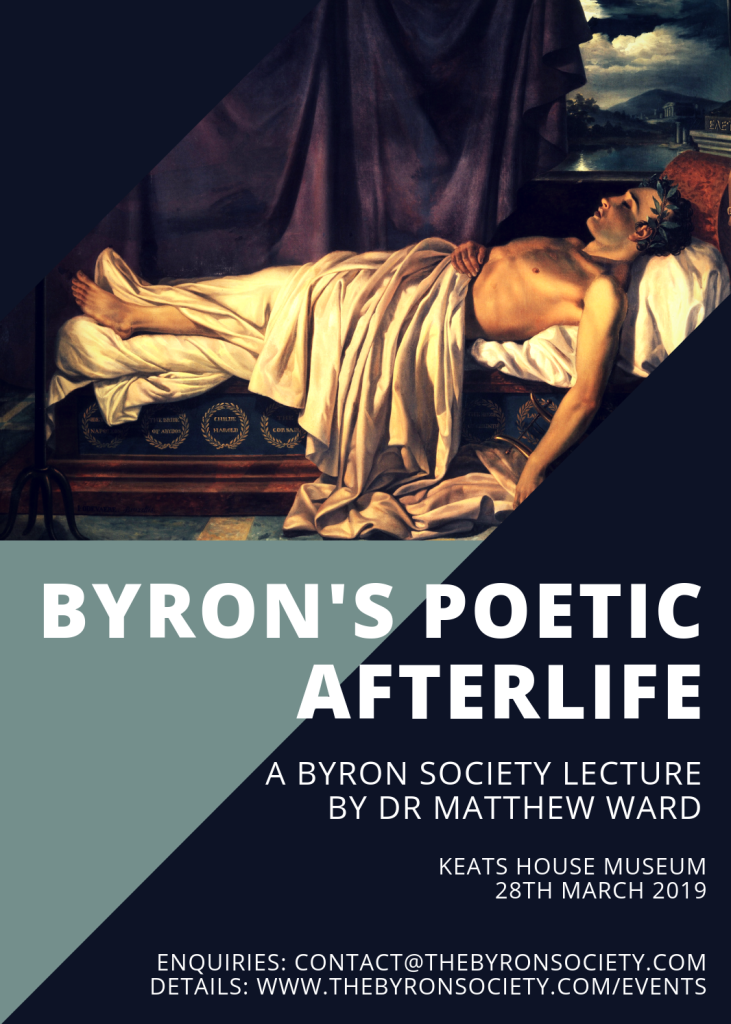 [/ezcol_1third] [ezcol_2third_end]28th March – Dr Matthew Ward at Keats House, ‘Byron’s Poetic Afterlife’
[/ezcol_1third] [ezcol_2third_end]28th March – Dr Matthew Ward at Keats House, ‘Byron’s Poetic Afterlife’
This talk considered the poetic afterlife of Byron in the long nineteenth century, focusing in particular on Matthew Arnold’s criticism and poetry. It reflected on literary inheritance by thinking about the various ways the Romantic influence of Byron is dealt with by those that came after, and how (for better or worse) they resurrect Byron in their writing. [/ezcol_2third_end]
[ezcol_1third]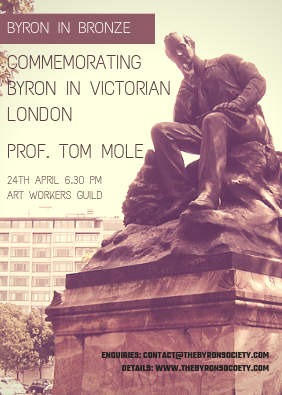 [/ezcol_1third] [ezcol_2third_end]24th April, Professor Tom Mole “Byron in Bronze: Commemorating Byron in Victorian London”
[/ezcol_1third] [ezcol_2third_end]24th April, Professor Tom Mole “Byron in Bronze: Commemorating Byron in Victorian London”
In this talk, Professor Mole examined the history of the statue of Byron by Richard Belt, now in Hyde Park, and evaluated its significance both for Byron’s Victorian reputation and for Victorian Londoners’ understanding of their city.
Not only was Byron the very first recipient of a blue commemorative plaque, but he also formed one of the Victorian’s new pantheon of socially accessible venerated figures…
[/ezcol_2third_end]
[ezcol_1third]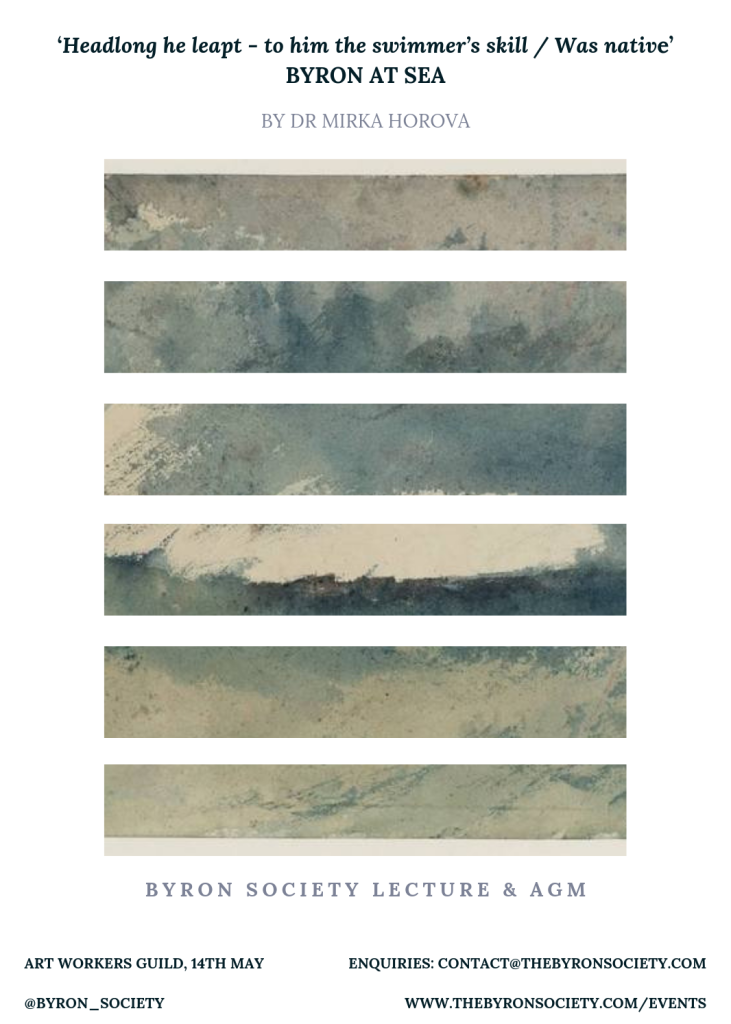 [/ezcol_1third] [ezcol_2third_end]14th May – AGM & Talk by Dr Mirka Horova
[/ezcol_1third] [ezcol_2third_end]14th May – AGM & Talk by Dr Mirka Horova
‘Headlong he leapt – to him the swimmer’s skill / Was native’: Byron at Sea
This talk addresses the many ways in which Byron’s life-long relationship with the sea is reflected in his writing. [/ezcol_2third_end]
[ezcol_1third]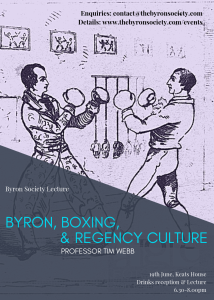 [/ezcol_1third] [ezcol_2third_end] 19th June – ‘Byron, Boxing, and Regency Culture’ by Professor Tim Webb
[/ezcol_1third] [ezcol_2third_end] 19th June – ‘Byron, Boxing, and Regency Culture’ by Professor Tim Webb
Like several of his literary contemporaries (the Keats brothers, Hazlitt, Reynolds, John Wilson (‘Christopher North’), Clare and Moore), Byron was attracted to boxing. In this lecture, Professor Tim Webb explored this powerful cultural phenomenon, gave expression to virtues which were quintessentially English, although it was condemned as degrading and brutal by others. [/ezcol_2third_end]
[ezcol_1third]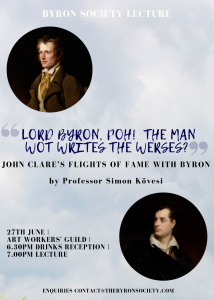 n[/ezcol_1third] [ezcol_2third_end]27th June – “Lord Byron, poh! the man wot writes the werses?: John Clare’s flights of fame with Byron”
n[/ezcol_1third] [ezcol_2third_end]27th June – “Lord Byron, poh! the man wot writes the werses?: John Clare’s flights of fame with Byron”
Professor Simon Kövesi, Head of the Department of English and Modern Languages at Oxford Brookes University, gave a lecture on Northamptonshire poet John Clare’s response to Byron’s life and works. Byron forms a kind of touchstone for Clare – of poetic sociability and literary success – even while he assertively pushes back against the elitism and snobbery he finds in Byron’s English Bards, forging his own social network of labouring-class poets as he does so.[/ezcol_2third_end]
[ezcol_1third]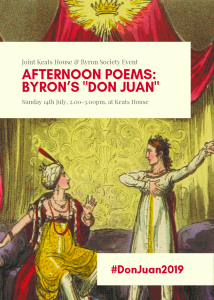 [/ezcol_1third] [ezcol_2third_end]14th July, Afternoon Poetry Reading at Keats House.
[/ezcol_1third] [ezcol_2third_end]14th July, Afternoon Poetry Reading at Keats House.
Celebrate the bicentenary of the publication of the first two cantos of Byron’s satirical epic, Don Juan. The poem caused a sensation when the first two Cantos appeared in July 1819: the ‘immoral content’ led the work to be deemed a ‘filthy and impious poem’… but it was very popular with the general public. Cannibalism, shipwreck, religious and sexual infidelity – Don Juan has it all! Join the Keats House Poetry Ambassadors for a special reading including works by Byron and some of his contemporaries. In partnership with the Byron Society. [/ezcol_2third_end]
[ezcol_1third]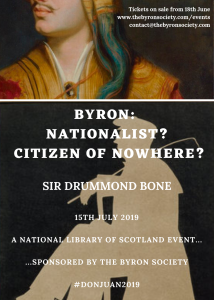 [/ezcol_1third] [ezcol_2third_end]
[/ezcol_1third] [ezcol_2third_end]
15th July – “Byron: Nationalist? Citizen of Nowhere?”
Edinburgh, Sir Drummond Bone at the National Library of Scotland
In his life and works Lord Byron showed interest in a whole panoply of different cultures and demonstrated his support for peoples against Empires. However, being ‘born for opposition’ and a frequent promoter of the individual (let alone his Anglo-Scottish genes) makes Byron’s own rootedness and ideas of identity complex. In this lecture Sir Drummond Bone explores concepts of nation and citizenship in Byron’s poetry, drama and other writings. [/ezcol_2third_end]
[ezcol_1third]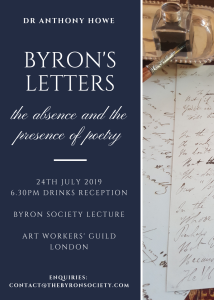 [/ezcol_1third] [ezcol_2third_end]
[/ezcol_1third] [ezcol_2third_end]
24th July Dr Anthony Howe “Byron’s Letters: the absence and the presence of poetry”
Under the Net letter writing has more or less gone the way of hunter gathering. Byron’s letters, at their best, are astonishing and their multifarious cultural background fascinating. This talk commented on those cultures while thinking about the letters from a literary-critical perspective. [/ezcol_2third_end]
[ezcol_1third] [/ezcol_1third] [ezcol_2third_end] 17th October – “Byron on Toobonai” by Nicholas Gayle
[/ezcol_1third] [ezcol_2third_end] 17th October – “Byron on Toobonai” by Nicholas Gayle
In this talk, Nicholas Gayle focused attention on the embarrassment of heroic riches Byron presents us with in ‘The Island’ and how they represent competing aspects of his own psyche—to wit, Capt. Bligh, Torquil, Neuha and Christian. How Byron keeps the narrative buoyant and free from heroic clutter, bringing off his one and only truly happy ending in the process, presents us with a fascinating story of a poet at the end of his tether. [/ezcol_2third_end]
[ezcol_1third] 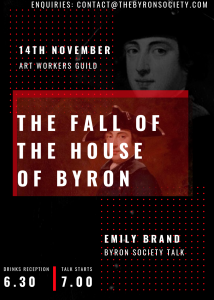 [/ezcol_1third] [ezcol_2third_end]14th November – The Fall of the House of Byron by Emily Brand
[/ezcol_1third] [ezcol_2third_end]14th November – The Fall of the House of Byron by Emily Brand
Author and Byron Society member, Emily Brand, gave the very first preview of her forthcoming book, based on her research into the colourful eighteenth-century ancestry of the 6th Lord Byron. A dramatic and scandal-filled family saga unfolding over three generations, The Fall of the House of Byron reveals how the stage was set for the rise of the nation’s most revered (and on occasion reviled) Romantic poet. [/ezcol_2third_end]
[ezcol_1third] 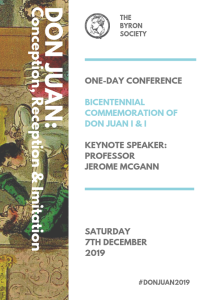 [/ezcol_1third] [ezcol_2third_end] “Byron’s Don Juan: Conception, Reception, Imitation”, 7th December, Nottingham.
[/ezcol_1third] [ezcol_2third_end] “Byron’s Don Juan: Conception, Reception, Imitation”, 7th December, Nottingham.
This one-day conference has been organised to celebrate the 200th anniversary of the publication of Don Juan Cantos I and II. Published anonymously in the summer of 1819, the first two cantos of Byron’s ‘satirical epic’ Don Juan provided the reading public with a work which self-consciously raised and challenged received ideas about fame, originality, and literary merit and was admired and reviled in almost equal measure. [/ezcol_2third_end]
[ezcol_1third] 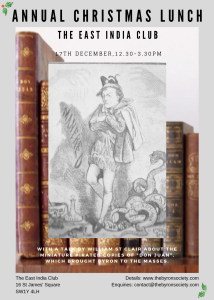 [/ezcol_1third] [ezcol_2third_end] 17th December – Annual Christmas Lunch
[/ezcol_1third] [ezcol_2third_end] 17th December – Annual Christmas Lunch
This year’s festive celebration of Christmas and Byron included a three course meal, wine, and a talk from the fabulous William St Clair. As the anniversary year of the first publication of Don Juan comes to an end, William St Clair reminded us of the books that made it, by far, the best selling work of the age. [/ezcol_2third_end]
2018
13th-14th January – Two Day Symposium “Byron Among the Poets”
Our members can register for free to attend a two-day symposium on Lord Byron’s literary relationships to poets from Virgil to Auden. In a series of papers by leading scholars, we will be mapping out the range and richness of Byron’s connectivity: what other poets meant to him, and what he meant to those who came after. Join us to explore the ways Byron might be thought to be – perhaps more than most – ‘among’ the poets: alluding and alluded to; collaborative; competitive; parodied; worked and reworked in canons, anthologies and editions. Papers will focus on the contours of individual literary relationships (what did Byron get from Pope? how did Eliot read Byron?), as well as exploring larger questions about the nature of poetic exchange, technical influence and generic formation.
[ezcol_1third]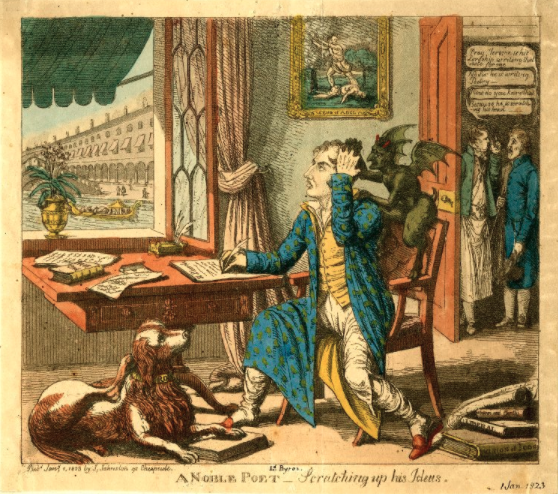 [/ezcol_1third] [ezcol_2third_end]“Mysticism of Numbers in Lord Byron’s Life and Works” by Professor Innes Merabishvili
[/ezcol_1third] [ezcol_2third_end]“Mysticism of Numbers in Lord Byron’s Life and Works” by Professor Innes Merabishvili
15th February at the Art Workers Guild, London
An evening talk exploring the presence and importance of the number six in the life and works of the sixth Lord Byron.[/ezcol_2third_end]
[ezcol_1third]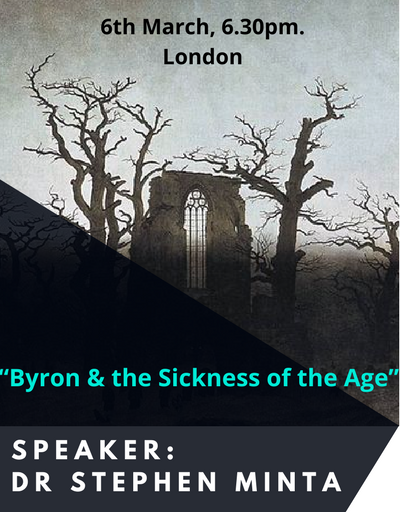 [/ezcol_1third] [ezcol_2third_end]“Byron and the Sickness of the Age” by Stephen Minta
[/ezcol_1third] [ezcol_2third_end]“Byron and the Sickness of the Age” by Stephen Minta
6th March, Art Workers Guild
This evening lecture looked at the chronology of the mal du siècle, and the value of the term as a way of thinking about Byron’s work before he took the great turn towards Don Juan. Stephen paid particular attention on Childe Harold’s Pilgrimage and the Giaour, exploring the ways in which the maladie du siècle hints at both the challenges and the limitations for Byron.
[/ezcol_2third_end]
[ezcol_1third] 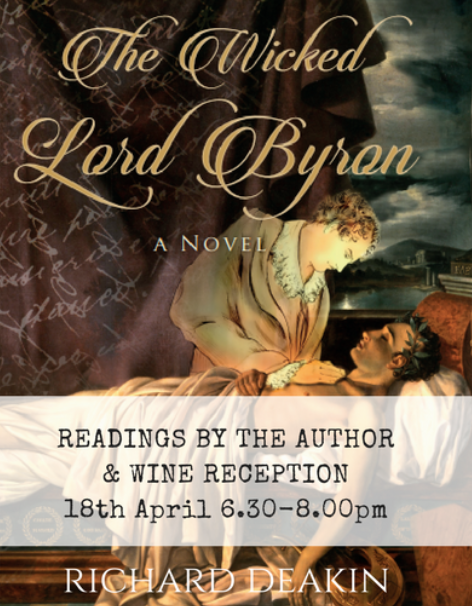 [/ezcol_1third] [ezcol_2third_end]
[/ezcol_1third] [ezcol_2third_end]
Richard Deakin, The Wicked Lord Byron
18th April, 6.30pm, the Art Workers Guild
Richard Deakin discussed the inspiration for his novel THE WICKED LORD BYRON, which presents the life story of the poet as he relives it in his final hours, from the point of view of both the laughing dandy and the tragic romantic. Robin, Lord Byron, who wrote the Foreword to the novel, introduced the event.
[/ezcol_2third_end]
[ezcol_1third]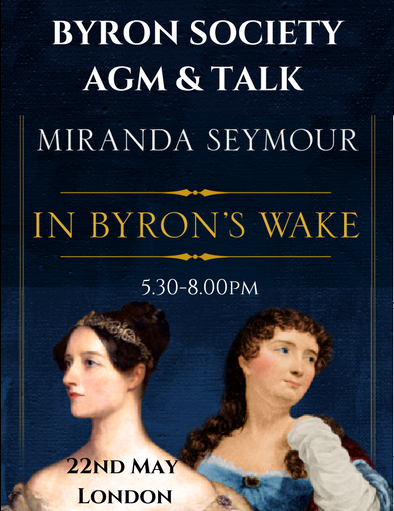 [/ezcol_1third] [ezcol_2third_end]Byron Society AGM
[/ezcol_1third] [ezcol_2third_end]Byron Society AGM
Followed by a talk from Miranda Seymour.
22nd May, at the Art Workers Guild, London
In this talk, Miranda Seymour discusses her new book, In Byron’s Wake, which examines the enduring influence of Byron on both his wife and his brilliant, eccentric child. [/ezcol_2third_end]
[ezcol_1third] 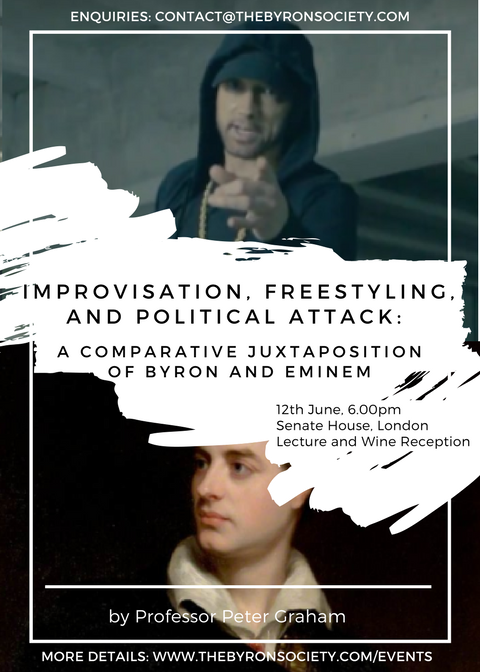 [/ezcol_1third] [ezcol_2third_end]
[/ezcol_1third] [ezcol_2third_end]
“Improvisation, Freestyling, and Political Attack: A Comparative Juxtaposition of Byron and Eminem” by Peter Graham
12th June, Senate House, London
Our Free Public Lecture was a talk comparing Byron and Eminem’s skilful, seemingly improvisational attacks on political establishments and politicians, on Lord Castlereagh in Byron’s Don Juan and on Trump in Eminem’s The Storm. [/ezcol_2third_end]
[ezcol_1third] 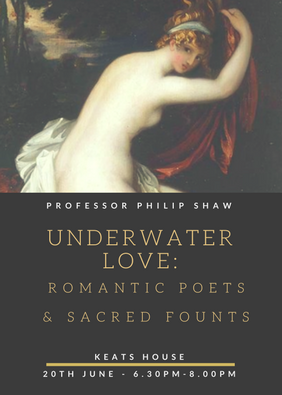 [/ezcol_1third] [ezcol_2third_end]
[/ezcol_1third] [ezcol_2third_end]
Keats House Public Lecture, 20th June
‘Underwater Love: Romantic Poets and Sacred Founts’ by Professor Phillip Shaw
This summer in the lovely environs of Keats House, Professor Phillip Shaw gave our annual joint public lecture with the Keats House Museum.
Following a discussion of Byron’s encounter with the restorative qualities of Arethusa’s sacred fount on Ithaca in 1823, the talk explored Keats and Wordsworth’s responases to Ovid’s retelling of this legend.
[/ezcol_2third_end]
[ezcol_1third] 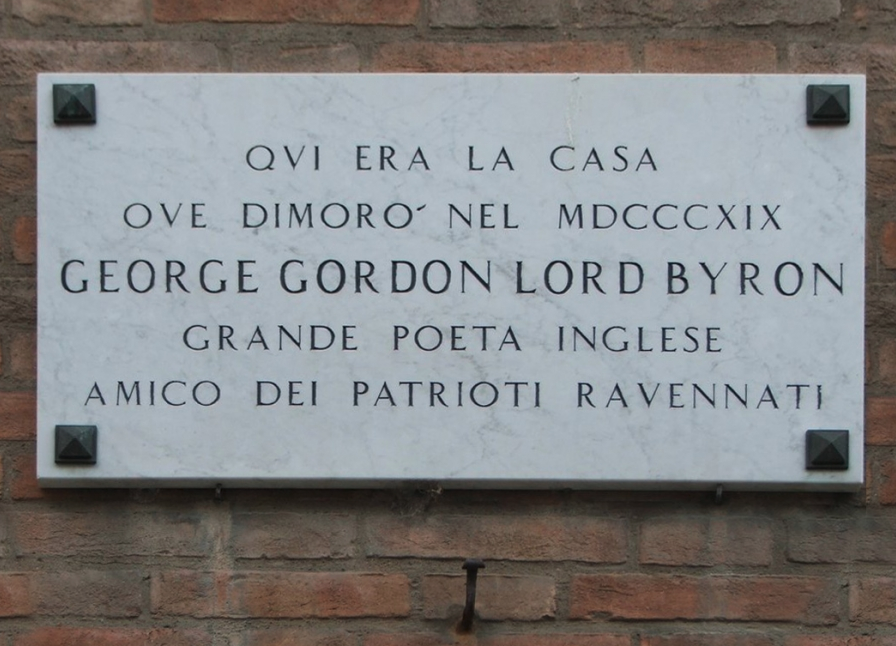 [/ezcol_1third] [ezcol_2third_end]
[/ezcol_1third] [ezcol_2third_end]
2nd – 7th July
The International Byron Conference at Ravenna, Italy.
The conference theme was “Byron: Improvisation and Mobility”.
[/ezcol_2third_end]
[ezcol_1third] 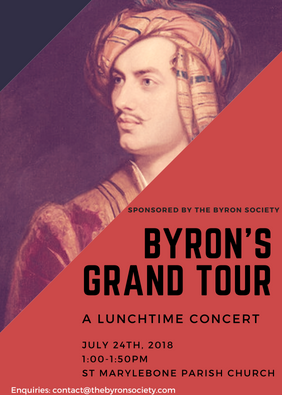 [/ezcol_1third] [ezcol_2third_end]
[/ezcol_1third] [ezcol_2third_end]
Tuesday 24th July: Byron’s Grand Tour, A Concert, St Marylebone Church Festival
We were delighted to sponsor an event at this year’s St Marylebone Church Parish Festival.
Byron was baptised at the St Marylebone Church in 1788, and in celebration of this, there was a lunchtime concert celebrating his Grand Tour across Europe, with readings and songs.
[/ezcol_2third_end]
[ezcol_1third]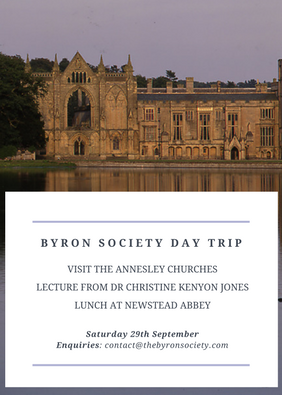 [/ezcol_1third] [ezcol_2third_end]Saturday 29th September: Day Trip
[/ezcol_1third] [ezcol_2third_end]Saturday 29th September: Day Trip
We travelled to Nottinghamshire and visited Newstead Abbey and the Annesley Churches. Speaking in the imposing surroundings of Byron’s own home, Dr Christine Kenyon Jones gave a lecture titled “Fact, fiction and entail: the cases of Byron and Jane Austen”.
[/ezcol_2third_end]
[ezcol_1third]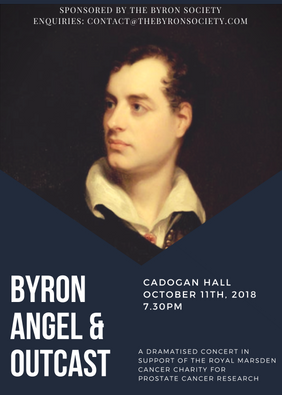 [/ezcol_1third] [ezcol_2third_end] Sponsored Concert – Byron: Angel & Outcast
[/ezcol_1third] [ezcol_2third_end] Sponsored Concert – Byron: Angel & Outcast
Cadogan Hall, London
11th October 2018, 7.30pm
We sponsored a dramatised concert in support of the Royal Marsden Charity for Prostate Cancer Research. In this concert, world-class pianist Dina Duisen and a cast of two actors brought Byron’s story to life with performed poems, journals and letters sensitively woven into piano works by Beethoven, Schubert, Chopin and Schuman
[/ezcol_2third_end]
[ezcol_1third]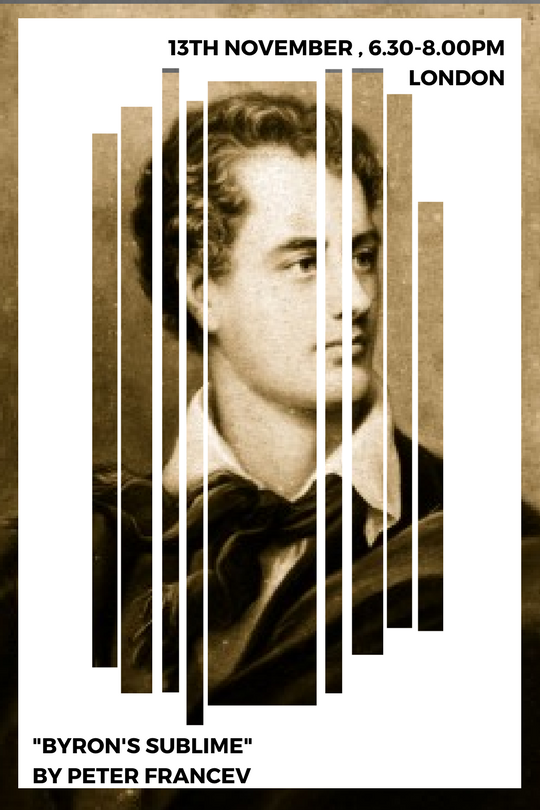 [/ezcol_1third] [ezcol_2third_end]
[/ezcol_1third] [ezcol_2third_end]
“Byron’s Sublime” by Peter Francev
13th November, at the Art Workers Guild London
An evening lecture on the unique ways in which Byron incorporates various modes of the Sublime, exploring the works of those who inspired him, and the influence these ideas had on Byron’s poetry.[/ezcol_2third_end]
[ezcol_1third]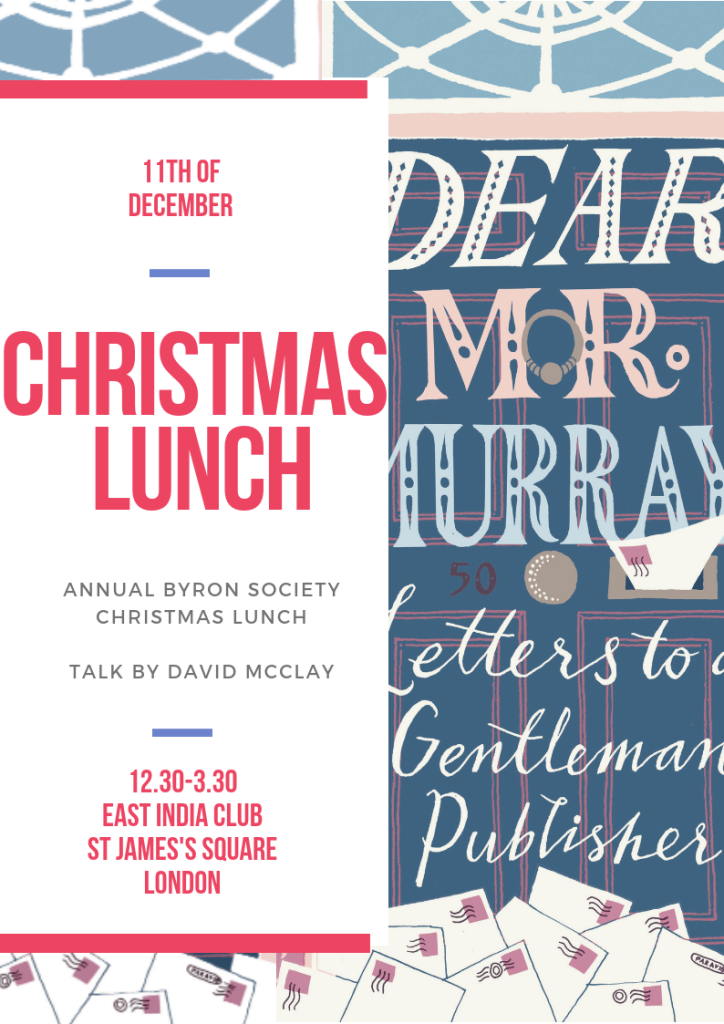 [/ezcol_1third] [ezcol_2third_end]
[/ezcol_1third] [ezcol_2third_end]
Annual Christmas Lunch & Talk from David McClay
11th December, East India Club
At our brilliant Christmas lunch, David McClay gave a talk about his new book, Dear Mr Murray. The publishing house of John Murray was founded in Fleet Street in 1768 and remained a family firm over seven generations. A celebration of John Murray Publishers 250th anniversary this year, Dear Mr Murray is a collection of letters from the Publisher’s archive. [/ezcol_2third_end]
18th January – Dr. Anna Camilleri – Byron and Heroism
Dr. Anna Camilleri of Oxford University is to give a talk to the Society on ‘Byron and Heroism’. The lecture will take at the Art Workers’ Guild, 6 Queen Square, WC1N 3AT. There will be a reception prior to the talk at 6.30 pm, which will commence at 7pm.
20th February – Daniele Sarrat – Such immortal fire, love for Byron and life of his works through French Romantic Artist from 1819 -1863
Daniele Sarrat of the French Byron Society is to give a lecture to us entitled: ‘Such immortal fire, love for Byron and life of his works through French Romantic Artist from 1819 -1863′. The event will take place at The Art Workers’ Guild, 6, Queen Square, WC1N 3AT at 6.30. The talk will be preceded by a wine reception. For those who wish dinner will be arranged at a nearby restaurant after the event. The cost of attending the lecture is £5, the dinner £25.
13 March – Short poems and extracts by Byron read by members
13 March there will be a poetry reading at the Art Workers’ Guild, 6, Queen Square WC1N 3AT. Short poems and extracts by Byron, or one of his contemporaries, will be chosen by members and read by them. The event will begin at 6.30 and include not only a wine reception, but sandwiches and other light food. The cost of attendance is £10, including food and drink.
27th April – Manchester Day
Full details here >>
11 May – Bernard Beatty – ‘Byron Now’
11 May, joint venture with Keats House, reception 6.30, lecture 7 pm. Tickets £7, available through Keats House, Eventbrite or the Byron Society.
23 May – Professor O’Neill – The Prisoner of Chillon and Manfred: Beauty, Freedom and the Function of Form
23 May Art Workers’ Guild, AGM, followed by a reception including sandwiches, and a lecture from Professor O’Neil of Durham University (title to be confirmed in due course).
1 July – Byron Society Visit To Harrow School, 1 July 2017
There will be a visit to the Exhibition of Byron artefacts and the Fourth Form Room next door where Byron carved is name on one of the panels. At 3 pm there will be a talk by Peter Hunter (who is our kind host): ‘A view from Mount Ida: Byron and Harrow’. From there we will take a five minute walk to St.. Mary’s Churchyard to see the memorial stone to Allegra and the Peachey Stone where Byron lay as a boy. More info >>
2 September – Newstead Abbey Visit
It is quite a few years since the Byron Society visited Newstaed Abbey and I am very pleased to say that we have arranged a visit, in conjunction with the Newstead Abbey Byron Society, for Saturday 2 September. We hope as many members as possible will wish to attend. Guests of members will also be welcome.
Full details >>
2 September – Newstead Abbey Visit
It is quite a few years since the Byron Society visited Newstaed Abbey and I am very pleased to say that we have arranged a visit, in conjunction with the Newstead Abbey Byron Society, for Saturday 2 September. We hope as many members as possible will wish to attend. Guests of members will also be welcome.
19 October – Lord Byron and the Debate of Sceptics and Platonists in European Romanticism
We would like to invite you to our upcoming Byron Society Lecture by Professor Rolf Lessenich, Professor Emeritus of English (and Comparative) Literature, Bonn University.
9th November – Byron and Southey in Epic Contest
Please join us at our Upcoming Lecture by Dr Joselyn Almeida-Beveridge, ‘Byron and Southey in Epic Contest’. Dr Almeida-Beveridge is Associate Professor in the Department of English, University of Massachusetts. Venue: the Art-Workers’ Guild, 6 Queen Square, SW1. Time: 6.30 for 7.00pm. Drinks will be served. £6 for members and guests. Please contact the Director if you wish to attend.
14th December – The Byron Society Christmas Lunch 12.30 for 1.00pm
Our annual Christmas lunch, with guest speakers. £30 for members and guests. Venue: the East India Club, 16 St James’s Square, SW1. Please contact the Director if you wish to attend.
2016
13th January – Jonathan Shears’ Talk on Byron’s Hypochondria at the Artworkers’ Guild:
Jonathan Shears’ talk on Byron’s Hypochondria on 13th January at the Artworkers’ Guild, 6 Queen’s Square WC1N 3AT at 6.30pm. There will be a wine reception before the lecture and dinner will be arranged for those that wish after the event at a nearby restaurant. £5 to attend the lecuture and £25 to attend the dinner. Payable on the day or in advance, please let me know if you wish to either or both of these events.
25th February – Josefina Tuominen-Pope – Byron, Celebrity and the Romantic Media
Josefina Tuominen-Pope will give a talk on ‘Byron, Celebrity and the Romantic Media’. The event will take place at The Art Workers’ Guild, 6 Queen Square, WC1N 3AT at 6.30 pm. The talk will be preceded by a wine reception. Dinner at a nearby restaurant will be arranged for those who wish.
The cost of attending the talk is £5 payable in advance or on the day. The cost of attending the dinner will be £25.
13th April – Matthew Bevis will talk on ‘Byron and Wordsworth in Stitches’
The talk will take place at The Art Workers’ Guild, 6 Queen Square, WC1N 3AT at 6.30 pmThe talk will be preceded by a wine reception and dinner will be arranged for those that wish after at a nearby restaurant.
£5 to attend the lecture £25 to attend the dinner. Payable on the day or in advance, please let me know if you wish to attend either or both of these events.
26th April – Bernard Beatty will talk on ‘The London of Wordsworth, Keats and Byron’
This is a joint event with Keates House on 26 April from 6.30 pm, at 10 Keats Grove, Hampstead NW3 2RR at 6.30 pm. Bernard Beatty is to talk on ‘The London of Wordsworth, Keats and Byron’. Please book through Keats House if possible, although the Society has reserved some seats which are available for purchase through the Director on a first come first served basis. The cost of attendance is £7 payable to Keats House.
The Society will arrange dinner for those who wish at a nearby restaurant at a cost of £25 a head after the talk.
24th May – Alan Rawes talk on ‘Byron’s Love Letters’
May 24th The AGM 5.30pm, followed by drinks and sandwiches, and a talk at 7pm by Alan Rawes on ‘Byron’s Love Letters’, free to members. At the The Art Workers’ Guild. 6, Queen Square, WC1N 3AT.
22nd June – David McClay literary reviewer of Byron’s Childe Harold among other works
June 22nd talk from David McClay will talk about the new joint exhibition held between the National Library of Scotland and Abbotsford on Scott as a literary reviewer of Byron’s Childe Harold among other works. 6.30pm at the The Art Workers’ Guild, 6 Queen Square, WC1N 3AT.
27th July – Aspects of Dr Johnson and Byron
There is to be an expedition to Dr Johnson’s House and talk by Dr Anthony Howe of Birmingham Universtiy on Aspects of Dr Johnson and Byron. Visit the house from 4.30pm, the talk and reception will be at 5.30pm. At 17 Gough Square, London EC4A 3DE. Cost £10 per head, payable in advance or on the day. Dinner will be arranged at a nearby restaurant for those that wish at a cost of £25.
12 September – Visit to Abbotsford
12 September Visit to Abbotsford: joint event with the Scottish Byron Society, full details will be confirmed in due course.
15 September – Michael Hendy will talk on ‘Byron’s Medicine Chest’
The Art Workers’ Guild 6, Queen Square, WC1N 3AT at 6.30 pm.
3 October 2016 – Book Launch – ‘Byron: The Poetry of Politics and the Politics of Poetry’
On 3rd October 2016 there is to be book launch at King’s College, London. ‘Byron: The Poetry of Politics and the Politics of Poetry’ edited by Roderick Beaton and Christine Kenyon-Jones. The book consists of essays from the Conference held by the International Association of Byron Societies in London in 2012. There will be a reception to accompany the launch. Further details will be given nearer the event.
18 October – It is “An Education in Adultery: Don Juan a moral Tale”. It is on 18 October and given by Emily Patterson-Morgan.
The Art Workers’ Guild 6, Queen S quare, WC1N 3AT at 6.30 pm.
It will be £5 to attend the lectures and £25 to attend dinner which will be arranged at a nearby restaurant for those that wish. Payable on the day or in advance. The AGM will be free and the reception will include sandwhiches.
15th December – Byron Society Christmas Lunch
The Christmas Lunch will be hosted on Thursday 15th December at the East Inida Club, 16 St James’s Square, London SW1Y 4LH
2015
20 January David McClay, Curator of the John Murray Archive and the Byron Papers at the National Library of Scotland:
‘Making Public Display of Lord Byron’.
17 February Geoffrey Bond: ‘The Art of Writing about Byron’.
25 March Professor Richard Cardwell: ‘She Walks in Beauty like the Night’.
26 May Society’s AGM plus a talk by Peter Cochran on Byron and Ali Pasha
22 June Christine Kenyon-Jones on Byron and Jane Austen.
1 – 6 July International Conference in Gdansk, Poland
9 September A Walk on the Wild Side: Lord Byron’s London.
The starting point for the walk is at Green Park Underground Station by the Diana Fountain (parkside exit of station). We finish at Hyde Park Corner. The cost of attending the walk will be £5. For those who wish, dinner will be arranged at the Rose and Crown, Old Park Lane at the conclusion of the walk at an approximate cost of £25.
More Info >>
10 October Peter Cochran’s Memorial Service
We’d love as many of his friends, students and fellow Byron scholars to take part as possible. Please let us know if you’d like to write, read or perform anything.
More Info >>
21 October talk by Jo Taylor – The Double Dungeon: Byron’s Home and County in 1815
24 November – Dr. David Woodhouse – Hazlitt’s Liberal Influence on Byron: The Laureate passages of Don Juan Re-Examined
The above two events will take place at The Art Workers’ Guild, with a reception at 6.30 pm and the talk beginning at 7 pm. Dinner will be arranged at a nearby restaurant for those who wish after the event. The cost of attending each talk will be £5, the cost of attending a dinner after the event will be approximately £25.
Dates of other events, will be given in due course.
